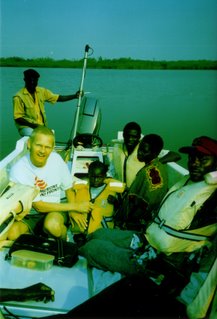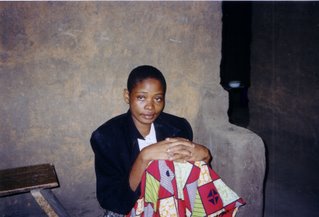New Year Greetings 2007
Not being a poet, here's a new Year wish for a bit of fun!

OK another impersonal group email, sigh!!
So it's nearly 2007, and the year has just flown by.
With so many memories both highs and lows;
I wonder if it's true, that man reaps what he sows.

Humans are without doubt very complex creatures;
In essence what is really distinctive about our features?
Our insight, our imagination, our passion or hope;
Or is it our innate ability for resilience or to just cope.
At times it would seem that there are many who don't care;
We are led to believe that fighting the war on terror, is just another
thing to bear.
We fight wars, discriminate against those less fortunate and punish others;
What are we doing, they're our mothers, fathers, sisters and brothers.

Sometimes I wonder if there is far too much greed;
Mortgages, shares, cars and everything else you need.
We talk of equality, freedom and sharing the wealth;
Globalization and democracy; hidden agendas by stealth.

Life moves on, day by day, getting faster and faster it seems;
How do we make sense of it all, confusion, clarity, every moment teems?
Can it be full of meaning, purpose and direction?
Some may say that it's all about karma, Allah or reflection.
Maybe it's time to contemplate on the good things that abound;
Like the simple pleasures, moments of tenderness and laughter all-round.
I wish you all my best wishes for the year ahead;
Be kind to yourself and everything else from A to Z.
A poem from David xx (ok it's my first attempt)

David Murray, a nurse from Sydney, is a Field Coordinator for Médecins Sans Frontières’ (MSF) programme in Nimba County, on Liberia’s eastern border with Guinea. Here MSF provides a variety of health services including HIV/AIDS, TB and nutritional care, community outreach and the training of local staff. Since joining the team in December last year David is beginning to get an insight into the Liberian culture.

The local people in northern Nimba, where our project is located, belong to two main tribes. The Gio and Mano are both Christian and linked culturally and historically. The other main tribe are the Mandingos, though most have either been killed through ethnic cleansing, or fled to neighbouring Guinea during the latter half of the 14 year civil war that ended in 2003. The Mandingo are Muslim and the burnt out mosques and houses in the town are a stark reminder of their fate.

The UN recently declared Nimba safe for refugees to return. There are approximately 15,000 Mandingos expected to return over the coming months. The UNHCR (UN High Commission for Refugees) in Guinea is facilitating this process and will soon start promoting voluntary repatriation. But many Mandingos are still too afraid to make the journey. I understand why these people are afraid. Many of the local people are critical of the Mandingos. We are watching this closely because, as they return, issues related to land, property rights and inter racial marriage could ignite further violence.

Most people here mix their Christian faith with a strong undercurrent of traditional beliefs including witchcraft. At this time of the year, secret societies, involving initiation ceremonies, are most active. There has been some talk of sacrificial killings and it's hidden nature makes it difficult to know whether it happens here in Nimba. Power is the motivation behind those who perpetrate such crimes and, now that the elections are coming up, reports of these practices have been increasing across Liberia.
It is tropical here and the vegetation is thick, green and lush, with rolling, heavily forested hills. The social life is pretty limited but we have a great team and a radio for news.. Some of us go for walks in the early morning or evening as there are a number of pleasant walks around town. This gives us an opportunity to meet local people, talk to school kids and feel connected to daily life.

On the work front, many new things are now evolving and giving me a sense of accomplishment and hope that we can either build capacity or raise awareness on issues. Margaret, our new training officer from Australia, has been busy with our outreach worker, Anthony, setting up an Outreach programme that will eventually have 140 Community Health Workers and Youth Workers carrying out health education with a focus on maternal health and HIV/AIDS. The stigma associated with HIV/AIDS is enormous and we suspect that the prevalence rate is between 5 and 10%, maybe higher

If all goes to plan, HIV/AIDS care and treatment with antiretroviral drugs (ARVs) will be fully effective from May or June. We plan to start voluntary counselling and testing (VCT) and prevention of parent to child transmission work next month. I think the outreach programme will be very effective and there are already signs that people are motivated to help their communities and are interested in attending workshops to gain further knowledge. However, traditional cultural practices such as male and female circumcision, family marriage, use of herbs (good or bad) and polygamy are rife and it will take along time to change some of these practices.
Several new national medical staff, including a HIV/TB nurse, are being recruited in Monrovia to help support activities in our clinics and hospital. It is exciting but we have many hurdles to cross. We still have nurses in the hospital refusing to take out IV lines on patients who are suspected of having HIV. Most of these are nurse aides and their level of knowledge is quite poor. But Joy, our expat hospital supervisor, and Amy, our doctor, have done a marvellous job developing the skills of these nurses aides through improved ways of working and coaching.

Overall, I feel that the Liberians are a strong people, very determined, resourceful and resilient. They have only known war, ingrained corruption and tribal conflict for a great part of recent history. Many people live in hope of a bright future, though with an understandable undercurrent of pessimism. We will have to wait and see what transpires, but I am glad that I am here as part of this process, witnessing events and sharing the expression of hope.

April 2005















